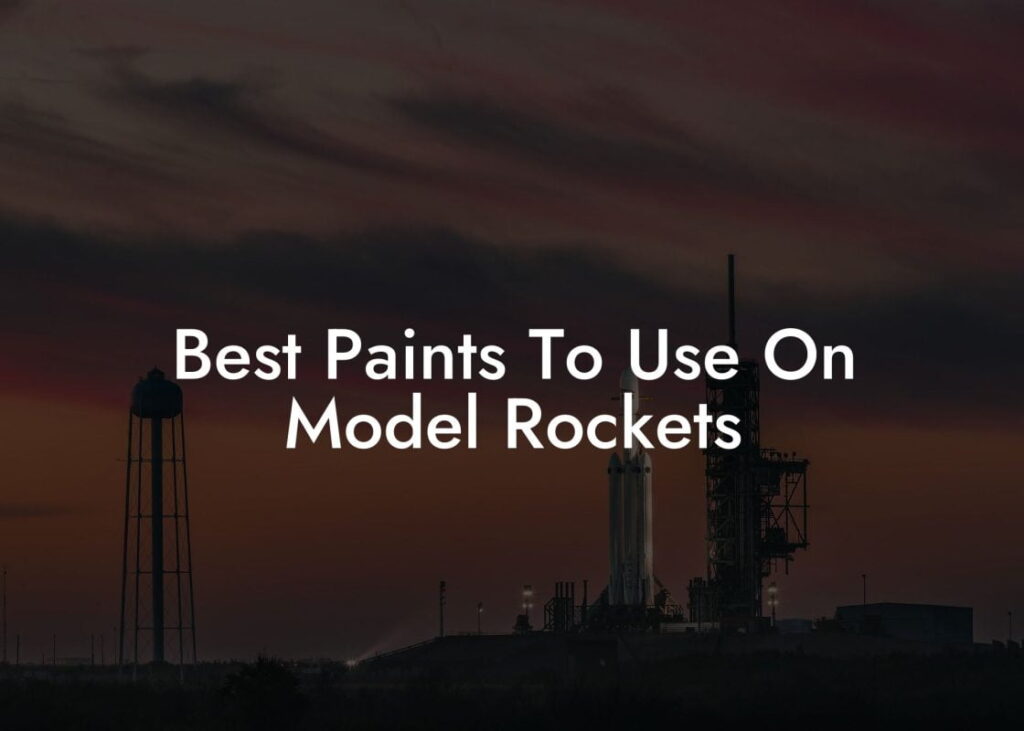When it comes to model rockets, creating a visually striking design is just as important as ensuring it flies high and safely. Whether you’re an experienced rocketeer or a beginner, choosing the right model rocket paint is key to achieving a stunning finish that not only looks great but also holds up during launches. In this guide, we’ll explore the best paints to use on your model rockets, helping you achieve a flawless finish while ensuring durability and performance.
Why the Right Paint Matters for Model Rockets
Model rockets are subjected to a variety of elements during launch: wind, temperature changes, and even the force of the liftoff itself. The paint you use not only contributes to the visual appeal of your rocket but also plays an essential role in protecting the body from wear and tear. The ideal model rocket paint should be durable, resistant to chipping, and lightweight to prevent affecting the rocket’s flight performance.
Best Paints for Model Rockets
- Acrylic Paints
Acrylic paints are a popular choice among rocketeers due to their versatility, ease of use, and fast drying time. They are water-based, which makes them easy to clean up, and they provide a smooth, vibrant finish. Acrylic paints are available in a wide range of colors and finishes, including matte, glossy, and metallic. When choosing model rocket paint, acrylics are excellent because they won’t add excessive weight, which is crucial for maintaining the rocket’s flight dynamics.
- Pros: Fast drying, easy cleanup, available in a wide range of colors.
- Best for: Beginners and hobbyists looking for vibrant colors and an easy-to-use option.
- Enamel Paints
Enamel paints are known for their durability and glossy finish. These paints tend to be more resistant to scratches and chipping compared to acrylics. While enamel paints do take longer to dry, they provide a robust finish that can withstand the rough conditions of a rocket launch. Enamel paints are perfect for those looking to achieve a professional-grade finish that lasts.
- Pros: Durability, glossy finish, scratch-resistant.
- Best for: Experienced modelers looking for a tough, long-lasting finish.
- Spray Paints
Spray paints are ideal for providing a smooth, even coat on model rockets. They are available in both acrylic and enamel formulas, so you can choose the type that best suits your needs. The key advantage of spray paint is its ability to cover large surface areas quickly, reducing the risk of brush marks. Additionally, spray paints are often available in specialty finishes such as metallic or matte, allowing you to create a unique and striking look.
- Pros: Smooth, even coverage, quick application, available in various finishes.
- Best for: Large rockets or those with intricate designs that require even coverage.
- Metallic and Pearl Finishes
If you want your model rocket to stand out, consider using metallic or pearl finishes. These paints give your rocket a sleek, shiny look that mimics the appearance of polished metal or adds depth and shimmer. Metallic and pearl paints are available in both acrylic and enamel varieties, offering a versatile option for achieving that high-end, professional finish.
- Pros: Eye-catching shimmer, sleek finish, high-end appearance.
- Best for: Those looking to make their rocket stand out in a crowd or for competitions.
- Decals and Vinyl Wraps
While not technically a paint, decals and vinyl wraps can be used in conjunction with model rocket paint to enhance your rocket’s design. These materials are pre-printed with intricate designs and can be applied to the rocket’s surface after painting. They are ideal for adding logos, sponsor marks, or complex patterns that would be difficult to paint by hand.
- Pros: Customizable, professional-looking designs, easy to apply.
- Best for: Customization and adding detailed patterns without painting.
How to Apply Paint on Model Rockets
For the best results, follow these steps when applying model rocket paint:
- Prepare the Surface: Sand the surface of the rocket lightly to ensure smooth adhesion. Clean the rocket thoroughly to remove any dust or oils that could interfere with the paint.
- Prime the Rocket: Applying a primer coat will help the paint adhere better and provide a more even finish. Choose a primer that is compatible with your paint type (acrylic or enamel).
- Apply Paint: Whether using spray paint or brush-on paint, apply thin, even coats. Allow each coat to dry before adding the next to prevent runs and smudging.
- Finish with a Clear Coat: Once the paint has dried, apply a clear coat to seal and protect the paint. This final layer will provide additional durability and shine to your rocket’s finish.
Tips for a Flawless Model Rocket Finish
- Test Paint Compatibility: Before applying paint to your entire rocket, test the paint on a small, inconspicuous area to ensure it adheres well and doesn’t damage the surface.
- Avoid Heavy Coats: Applying thick layers of paint can add unnecessary weight to the rocket, which could affect its flight performance.
- Allow Proper Drying Time: Make sure the paint is completely dry before handling or launching your model rocket to avoid smudging or chipping.
Conclusion
Choosing the right model rocket paint is crucial to achieving a stunning and durable finish for your creations. Whether you prefer acrylics for their easy application, enamels for their durability, or specialty finishes like metallics for an eye-catching look, there is a paint option that will meet your needs. With the right paint and techniques, you can make your model rocket stand out, both on the launch pad and in the air. So, pick your favorite colors, get creative, and let your rocket soar in style!



